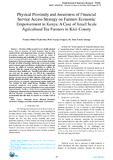Physical Proximity and Awareness of Financial Service Access Strategy on Farmers Economic Empowerment in Kenya: A Case of Small Scale Agricultural Tea Farmers in Kisii County

View/
Date
2018-10Author
Nyakweba, Thomas Ombui
Gongera, George
Asianga, Irine Koech
Metadata
Show full item recordAbstract
The focus of this research was to identify physical access, that is, presence of bank branches that is often considered the most important source of access to finance in developing countries and awareness. Despite the notion of branchless banking and availability of ATM machines, yet easy access to a normal bank branch staffed with people is still very important in the less developed areas. Access to bank branches, develops the habit of banking which leads to increased savings and investment, improved efficiency of allocation of capital, and increase the ability of monetary authorities to stabilize the economy while the amount of saving depends partly on how widespread these facilities are. Stratified and random sampling was used and the sample size was 398 of the respondents. Questionnaires and observations were used to collect data. Data analysis was done by use of SPSS. Objective of the study was to identify physical proximity and awareness of financial service access strategy on economic empowerment among Small Scale Tea Farmers in Kisii county-Kenya. Findings revealed a statistically significant weak positive relationship between physical proximity on access to financial services and economic empowerment(r = 0.428, p < 0.05). It was concluded that, there is inadequate infrastructure development in the rural areas thus affecting financial accessibility among tea farmers. It was recommended that this study be carried on a broader scale in Kenya.
Collections
- Publications 2019 [91]
